|
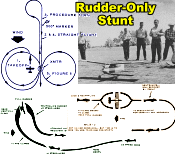 Not all that long ago, my interpretation
of radio-controlled (R/C)
rudder-only
(RO) flying was that the airplane operated from a single channel controlling the
rudder. That is the way it began, I suppose, but as aerobatic competition entered
the picture, it expanded to include throttle control on the engine. Some models,
I believe might have also had elevators and/or aileron control, but during competition
flights, only the engine throttle and rudder were allowed to be manipulated. I have
flown many R/C airplanes with just two channels - rudder and elevator - but never
with rudder and engine throttle. In fact, the only airplane I have ever flown with
only rudder control is an experimental rubber-powered job with an electromagnet
coil and a permanent magnet on the rudder. Many magazine articles... Not all that long ago, my interpretation
of radio-controlled (R/C)
rudder-only
(RO) flying was that the airplane operated from a single channel controlling the
rudder. That is the way it began, I suppose, but as aerobatic competition entered
the picture, it expanded to include throttle control on the engine. Some models,
I believe might have also had elevators and/or aileron control, but during competition
flights, only the engine throttle and rudder were allowed to be manipulated. I have
flown many R/C airplanes with just two channels - rudder and elevator - but never
with rudder and engine throttle. In fact, the only airplane I have ever flown with
only rudder control is an experimental rubber-powered job with an electromagnet
coil and a permanent magnet on the rudder. Many magazine articles...
 Former
Nazi Germany's famed rocket scientist
Dr. Wernher von Braun's 1963 Popular Science magazine column answers
questions submitted by reader representing the overwhelming public interest in space
science, which motivated his monthly contributions to share complex topics accessibly.
He explains that steering large rockets involves deflecting exhaust thrust via swiveling
nozzles or jet vanes, contrasting liquid and solid propellant methods. Astronauts
exit pressurized cabins using airlocks, depressurizing the compartment before venturing
into space. Liquid hydrogen's efficiency as fuel stems from its high energy release
and low molecular weight, yielding superior exhaust velocity. Von Braun also touches
on the moon's likely sterility, solar flares' hazards to manned missions, and the
sun’s volatile activity, emphasizing space science’s interdisciplinary and dynamic
nature. This is the first of two articles submitted... Former
Nazi Germany's famed rocket scientist
Dr. Wernher von Braun's 1963 Popular Science magazine column answers
questions submitted by reader representing the overwhelming public interest in space
science, which motivated his monthly contributions to share complex topics accessibly.
He explains that steering large rockets involves deflecting exhaust thrust via swiveling
nozzles or jet vanes, contrasting liquid and solid propellant methods. Astronauts
exit pressurized cabins using airlocks, depressurizing the compartment before venturing
into space. Liquid hydrogen's efficiency as fuel stems from its high energy release
and low molecular weight, yielding superior exhaust velocity. Von Braun also touches
on the moon's likely sterility, solar flares' hazards to manned missions, and the
sun’s volatile activity, emphasizing space science’s interdisciplinary and dynamic
nature. This is the first of two articles submitted...
 Aircraft historians might find the information
from this 1942 edition of Flying Aces magazine useful. As has long been
the case on many Russian airplanes and helicopters, the basic outlines - and often
even the details - are recognizable from the original versions designed by the United
States, England, and Germany. The Russkies have been short on design and test capabilities
and long on materials, manpower, and espionage agents. It wouldn't be so bad if
the copying was not so obvious. Even their attempt at a space shuttle was a carbon
copy of ours. If not for their leaders' commitment to Communism and Socialism, Russia
could be... Aircraft historians might find the information
from this 1942 edition of Flying Aces magazine useful. As has long been
the case on many Russian airplanes and helicopters, the basic outlines - and often
even the details - are recognizable from the original versions designed by the United
States, England, and Germany. The Russkies have been short on design and test capabilities
and long on materials, manpower, and espionage agents. It wouldn't be so bad if
the copying was not so obvious. Even their attempt at a space shuttle was a carbon
copy of ours. If not for their leaders' commitment to Communism and Socialism, Russia
could be...
 My daughter and her husband bought an 11-acre
chunk of a small, retired dairy farm in North Carolina a few years ago. Their property
included all of the original buildings, including the house, a large workshop, farm
equipment shed row, milking stalls, milk processing area, hay storage, a chicken
house, and a few other structures. Nearly everything is at least 50 years old -
and it shows. There are two active
wells on the property - one next to the house, and another in a field next to
a utility building. They are independent, but there is a pipe connecting the two
systems, with a valve in between to isolate them if necessary. The photo/drawing
to the right shows, schematically, what we believe, based on testing, to be the
water line layout. The valve was originally open, and then one day there was no
water service. With two pumps in parallel, if one pump fails the other will supply
sufficient water for all needs in what is now a domestic setting... My daughter and her husband bought an 11-acre
chunk of a small, retired dairy farm in North Carolina a few years ago. Their property
included all of the original buildings, including the house, a large workshop, farm
equipment shed row, milking stalls, milk processing area, hay storage, a chicken
house, and a few other structures. Nearly everything is at least 50 years old -
and it shows. There are two active
wells on the property - one next to the house, and another in a field next to
a utility building. They are independent, but there is a pipe connecting the two
systems, with a valve in between to isolate them if necessary. The photo/drawing
to the right shows, schematically, what we believe, based on testing, to be the
water line layout. The valve was originally open, and then one day there was no
water service. With two pumps in parallel, if one pump fails the other will supply
sufficient water for all needs in what is now a domestic setting...
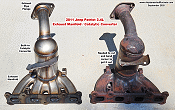 I have the great misfortune of being a 2011
Jeep Patriot owner with the
welded steel
combination exhaust manifold and catalytic converter that forms heat stress cracks,
resulting in loud noise levels in the passenger cabin. Whilst out driving one day
recently, I noticed the sound level increased significantly, but not at all speeds.
After a lot of testing and researching on the Internet, I concluded it had to be
either a bad muffler, a loose baffle in the catalytic converter, or a crack in the
exhaust manifold. It sure sounded like it was coming from the engine area, but I
figured at 102,000 miles, it wouldn't hurt to try replacing the muffler first. No
such luck. I had a new muffler and the same old noise. Upon removing the upper heat
shield from the exhaust manifold, I could immediately see two crack lines in the
steel... I have the great misfortune of being a 2011
Jeep Patriot owner with the
welded steel
combination exhaust manifold and catalytic converter that forms heat stress cracks,
resulting in loud noise levels in the passenger cabin. Whilst out driving one day
recently, I noticed the sound level increased significantly, but not at all speeds.
After a lot of testing and researching on the Internet, I concluded it had to be
either a bad muffler, a loose baffle in the catalytic converter, or a crack in the
exhaust manifold. It sure sounded like it was coming from the engine area, but I
figured at 102,000 miles, it wouldn't hurt to try replacing the muffler first. No
such luck. I had a new muffler and the same old noise. Upon removing the upper heat
shield from the exhaust manifold, I could immediately see two crack lines in the
steel...
 A couple years ago I posted an article about
the Victor Stanzel ElectroMic "Copter" Tethered Helicopter that I had bought on
eBay. It was just like the one I had as a pre-teen in the 1960's. If memory serves
me correctly, I also had one of the ElectroMic Flash Tethered Airplanes as well.
Someday I'll probably buy one of those on eBay. The webpage hyperlinked above has
a video embedded that tells the story of the
Stanzel Brothers' Model Airplane Museum. You will be amazed at
all the types of models they produced - powered airplanes, gliders, helicopters,
flying saucers. They were a couple of the earliest pioneers in manufacturing ready... A couple years ago I posted an article about
the Victor Stanzel ElectroMic "Copter" Tethered Helicopter that I had bought on
eBay. It was just like the one I had as a pre-teen in the 1960's. If memory serves
me correctly, I also had one of the ElectroMic Flash Tethered Airplanes as well.
Someday I'll probably buy one of those on eBay. The webpage hyperlinked above has
a video embedded that tells the story of the
Stanzel Brothers' Model Airplane Museum. You will be amazed at
all the types of models they produced - powered airplanes, gliders, helicopters,
flying saucers. They were a couple of the earliest pioneers in manufacturing ready...
 While perusing the local Goodwill store,
Melanie and I happened upon this old
gooseneck lamp.
Unlike most of the newer models found in places like Walmart, this one is made of
heavy stamped steel, and the gooseneck part is very sturdy with no plastic. When
you bend this lamp into position, it stays exactly where you put it without reflexing
back a little. It was just what Melanie needed for use on her sewing table, so we
bought it as a fixer-upper. As can be seen in the photos, the original condition
was useable, but not... While perusing the local Goodwill store,
Melanie and I happened upon this old
gooseneck lamp.
Unlike most of the newer models found in places like Walmart, this one is made of
heavy stamped steel, and the gooseneck part is very sturdy with no plastic. When
you bend this lamp into position, it stays exactly where you put it without reflexing
back a little. It was just what Melanie needed for use on her sewing table, so we
bought it as a fixer-upper. As can be seen in the photos, the original condition
was useable, but not...
 Our one-car garage does not have a lot of
extra space in it, especially considering it also holds a riding lawn mower, a snow
blower, a backup power generator, and various and sundry yard and car tools. That
doesn't leave much room for the assortment of shoes and boots needed by Melanie
and me. We had been using a stack of cinder
blocks to stuff shoes in, but they looked rather crude and the holes were not
really big enough to allow the shoes to be fully enclosed. After completing building
a set of stairs into the basement, there were end pieces of the stair treads left
over that were just the right width to fit into the space where the cinder blocks
used to be stacked. 2x3 framing lumber... Our one-car garage does not have a lot of
extra space in it, especially considering it also holds a riding lawn mower, a snow
blower, a backup power generator, and various and sundry yard and car tools. That
doesn't leave much room for the assortment of shoes and boots needed by Melanie
and me. We had been using a stack of cinder
blocks to stuff shoes in, but they looked rather crude and the holes were not
really big enough to allow the shoes to be fully enclosed. After completing building
a set of stairs into the basement, there were end pieces of the stair treads left
over that were just the right width to fit into the space where the cinder blocks
used to be stacked. 2x3 framing lumber...
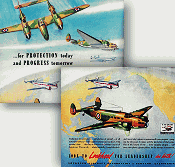 During World War II, many companies
who manufactured products for the military bought advertising space in popular household
magazines such as The Saturday Evening Post, Ladies' Home Journal,
Popular Mechanics, Better Homes & Gardens, Good Housekeeping,
and, as shown here Life. In this instance,
Lockheed Aircraft Corporation
(before merging with Martin Aircraft in 1995) ran a two-pager in 1942, near the
beginning of official U.S. involvement following the Japanese bombing of Pearl Harbor,
featuring its line of both commercial and military aircraft. The U.S. government
commandeered many companies' manufacturing facilities to mandate conversion to wartime
products. It happened across a wide swath of industries including aircraft, automotive... During World War II, many companies
who manufactured products for the military bought advertising space in popular household
magazines such as The Saturday Evening Post, Ladies' Home Journal,
Popular Mechanics, Better Homes & Gardens, Good Housekeeping,
and, as shown here Life. In this instance,
Lockheed Aircraft Corporation
(before merging with Martin Aircraft in 1995) ran a two-pager in 1942, near the
beginning of official U.S. involvement following the Japanese bombing of Pearl Harbor,
featuring its line of both commercial and military aircraft. The U.S. government
commandeered many companies' manufacturing facilities to mandate conversion to wartime
products. It happened across a wide swath of industries including aircraft, automotive...
 Prior to the widespread use of mufflers
on radio controlled model aircraft engines,
exhaust dampers were installed that worked in unison with the
throttle. They were oblong or butterfly-shaped flat pieces of metal that pivoted
in the center and were connected via a short pushrod to the carburetor's throttle
arm. At full throttle, the damper was straight up and down to block the exhaust
port as little as possible. At idle, the damper usually totally blocked off the
exhaust port; of course some exhaust was still able to exit or the engine would
choke out and stop running. The first R/C engines I used in the 1970's came with
exhaust dampers... Prior to the widespread use of mufflers
on radio controlled model aircraft engines,
exhaust dampers were installed that worked in unison with the
throttle. They were oblong or butterfly-shaped flat pieces of metal that pivoted
in the center and were connected via a short pushrod to the carburetor's throttle
arm. At full throttle, the damper was straight up and down to block the exhaust
port as little as possible. At idle, the damper usually totally blocked off the
exhaust port; of course some exhaust was still able to exit or the engine would
choke out and stop running. The first R/C engines I used in the 1970's came with
exhaust dampers...
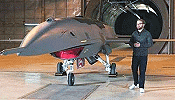 "Anduril Industries recently unveiled its
collaborative combat aircraft, or CCA, when CEO and co-founder Brian Schimpf took
a journalist into the hangar to show off the company's new
Fury, an unmanned autonomous CCA. It was the first time any media outlet was
permitted to view the aircraft up close. As a CCA, the Fury is designed to work
in coordination with manned aircraft. Anduril developed the Fury to sense and understand
everything that is happening in the airspace, and as it flies out ahead of a manned
aircraft, its job is to react to protect the pilot flying in trail. Schimpf said,
'The first thing you notice about this plane is that there's no cockpit. There is
no seat. There's no controls..." "Anduril Industries recently unveiled its
collaborative combat aircraft, or CCA, when CEO and co-founder Brian Schimpf took
a journalist into the hangar to show off the company's new
Fury, an unmanned autonomous CCA. It was the first time any media outlet was
permitted to view the aircraft up close. As a CCA, the Fury is designed to work
in coordination with manned aircraft. Anduril developed the Fury to sense and understand
everything that is happening in the airspace, and as it flies out ahead of a manned
aircraft, its job is to react to protect the pilot flying in trail. Schimpf said,
'The first thing you notice about this plane is that there's no cockpit. There is
no seat. There's no controls..."
 After just 33 years, this crewel picture
that Melanie stitched is complete and has a
custom frame. If
memory serves correctly, we bought the crewel kit at a Ben Franklin store in Severna
Park, Maryland, in 1985 while living in Arnold, Maryland. She started it shortly
after getting it, and then it was put away until last year, 2017, when she decided
to complete the project. Most, if not all, of the needlework pictures Melanie has
done over the years have been placed in custom frames made by me. I've used pine,
oak, teak, hickory, mahogany, and now maple for this frame. The maple wood... After just 33 years, this crewel picture
that Melanie stitched is complete and has a
custom frame. If
memory serves correctly, we bought the crewel kit at a Ben Franklin store in Severna
Park, Maryland, in 1985 while living in Arnold, Maryland. She started it shortly
after getting it, and then it was put away until last year, 2017, when she decided
to complete the project. Most, if not all, of the needlework pictures Melanie has
done over the years have been placed in custom frames made by me. I've used pine,
oak, teak, hickory, mahogany, and now maple for this frame. The maple wood...
 Per this 1962 Popular Science magazine
article, while awaiting Mariner 2's historic sweep past the cloud-shrouded planet
of Venus, experts of imagined Earth's nearest neighbor alternately as a lush prehistoric
swamp-world, a dust-choked desert, an endless steamy ocean, or a tar-lake Hades
reeking with oily smog. What they knew for sure: Venus, a near-twin to Earth in
size and gravity, shows only a bright, lemon-yellow veil when viewed through telescopes.
Spectrograms pushed earlier revealed thick carbon-dioxide and a wisp of water vapor,
but no firm answers about rotation speed or surface material. Then came shocking
new microwave temperature data -600 °F surface heat, day and night. It would be
1975 until the USSR's Venera 9 spacecraft landed on the surface and radioed
back the first images... Per this 1962 Popular Science magazine
article, while awaiting Mariner 2's historic sweep past the cloud-shrouded planet
of Venus, experts of imagined Earth's nearest neighbor alternately as a lush prehistoric
swamp-world, a dust-choked desert, an endless steamy ocean, or a tar-lake Hades
reeking with oily smog. What they knew for sure: Venus, a near-twin to Earth in
size and gravity, shows only a bright, lemon-yellow veil when viewed through telescopes.
Spectrograms pushed earlier revealed thick carbon-dioxide and a wisp of water vapor,
but no firm answers about rotation speed or surface material. Then came shocking
new microwave temperature data -600 °F surface heat, day and night. It would be
1975 until the USSR's Venera 9 spacecraft landed on the surface and radioed
back the first images...

This particular
Hobby People advertisement is from page 53 of the March 1970 issue
of American Aircraft Modeler magazine. Hobby People was probably the first
company that I ever did mail order from to get airplane supplies. Hobby People is
no longer in operation. All copyrights (if any) are hereby acknowledged. Use the
U.S. Bureau of Labor Statistics' inflation calculator to see what items cost in
today's dollars. For instance, that $3.99 "Cox .049 Babe Bee" engine would be $26.16
in 2018 money. The "regular" price of $6.00 would be $39.34 in 2018. Cox International.
Use the U.S. Bureau of Labor Statistics' inflation calculator to see what items
cost in today's dollars. For instance, that $3.99 "Cox .049 Babe Bee" engine would
be $34.05 in 2025 money...
 One of the first woodworking projects I
remember doing after Melanie and I were married and in our own house was making
a paper towel
holder out of some scrap pieces of oak flooring. The wood was in the basement
of the house, probably from when it was originally installed sometime in the 1950s.
A few pieces were glued together along their tongue and groove edges, and then scraped
and sanded to a smooth, flat surface. The bottom curved relief shape was retained
for character. At some point during our many household moves, the paper towel holder
disappeared - we probably donated it as with... One of the first woodworking projects I
remember doing after Melanie and I were married and in our own house was making
a paper towel
holder out of some scrap pieces of oak flooring. The wood was in the basement
of the house, probably from when it was originally installed sometime in the 1950s.
A few pieces were glued together along their tongue and groove edges, and then scraped
and sanded to a smooth, flat surface. The bottom curved relief shape was retained
for character. At some point during our many household moves, the paper towel holder
disappeared - we probably donated it as with...
 "From a [maple] seed-inspired design to a
26-minute flight time on a single rotor, a new
monocopter developed by SUTD researchers marks a 10-year journey towards redefining
how efficient small flying robots can be. When Singapore celebrated its 50th year
of independence in 2015, a team of student researchers led by Associate Professor
Foong Shaohui from Singapore University Technology and Design (SUTD) embarked on
an ambitious challenge: to design and build a drone capable of 50 minutes of sustained
flight. At the time, most hobbyist quadcopters could barely manage half of that.
The SG50 Multi-Rotor Drone..." "From a [maple] seed-inspired design to a
26-minute flight time on a single rotor, a new
monocopter developed by SUTD researchers marks a 10-year journey towards redefining
how efficient small flying robots can be. When Singapore celebrated its 50th year
of independence in 2015, a team of student researchers led by Associate Professor
Foong Shaohui from Singapore University Technology and Design (SUTD) embarked on
an ambitious challenge: to design and build a drone capable of 50 minutes of sustained
flight. At the time, most hobbyist quadcopters could barely manage half of that.
The SG50 Multi-Rotor Drone..."
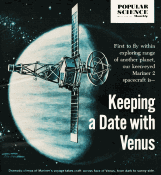 At launch in 1962 when this article appeared
in Popular Science magazine,
Mariner 2's planners imagined Venus cloaked by benign oceans or lush swamps
- temperatures perhaps only "hot-house Earth" elevated. Microwave echoes from Earth
hinted at a 600 °F surface, yet editors clung to hope that dense clouds concealed
cooler seas and maybe biology. Infrared spectra were interpreted as carbon-dioxide
greenhouse gases in a thin, relatively clear layer; the idea of surface pressures
a hundred times Earth, sulfuric-acid rain, and global 860 °F basalt plains
lay outside anyone's paradigm. A magnetosphere like Earth's was expected; Venus
instead proved geologically inert and wind-scoured, with sluggish super-rotation.
Fifty years later, radar from Magellan and Earth-borne interferometry have overwritten
1962 optimism with images of barren basalt plains and scorching CO₂ night... At launch in 1962 when this article appeared
in Popular Science magazine,
Mariner 2's planners imagined Venus cloaked by benign oceans or lush swamps
- temperatures perhaps only "hot-house Earth" elevated. Microwave echoes from Earth
hinted at a 600 °F surface, yet editors clung to hope that dense clouds concealed
cooler seas and maybe biology. Infrared spectra were interpreted as carbon-dioxide
greenhouse gases in a thin, relatively clear layer; the idea of surface pressures
a hundred times Earth, sulfuric-acid rain, and global 860 °F basalt plains
lay outside anyone's paradigm. A magnetosphere like Earth's was expected; Venus
instead proved geologically inert and wind-scoured, with sluggish super-rotation.
Fifty years later, radar from Magellan and Earth-borne interferometry have overwritten
1962 optimism with images of barren basalt plains and scorching CO₂ night...
 The
1962 AMA Nationals competition was considered the first major
contest for scale radio controlled airplanes. To wit, this article from the 1963
Annual edition of American Modeler, says R/C scale "finally 'came of age.'"
Proportional radio sets were becoming common and the reliability of the airborne
electronics and batteries was going up while weight and size was coming down. Modelers
were much more willing to trust the radios to safely control models that often took
many hundreds of hours to build. Sharing frequencies at or near to the 27 MHz
band allocated by the FCC to R/C was still a huge risk, but the venues of major
contests provided protected areas that were far enough from most interference... The
1962 AMA Nationals competition was considered the first major
contest for scale radio controlled airplanes. To wit, this article from the 1963
Annual edition of American Modeler, says R/C scale "finally 'came of age.'"
Proportional radio sets were becoming common and the reliability of the airborne
electronics and batteries was going up while weight and size was coming down. Modelers
were much more willing to trust the radios to safely control models that often took
many hundreds of hours to build. Sharing frequencies at or near to the 27 MHz
band allocated by the FCC to R/C was still a huge risk, but the venues of major
contests provided protected areas that were far enough from most interference...
 "A space domain awareness (SDA) payload
has flown on a sub-orbital spaceplane at supersonic speeds, an advance that could
provide an alternative to conventional satellite-based SDA. Scout Space's 'Morning
Sparrow' sensor suite flew aboard Dawn Aerospace's Aurora platform, an uncrewed
reusable rocket-powered high-altitude aircraft. The flight tested the integration
of Scout's 'Morning Sparrow' sensor suite aboard the Aurora platform, taking off
from Tāwhaki National Aerospace Centre in New Zealand. The flight also marks Scout
as the first commercial operator to fly on Dawn Aerospace's Aurora under a strategic
partnership in which Scout will develop a first-of-its-kind tactically responsive
Very Low Earth Orbit (VLEO)..." "A space domain awareness (SDA) payload
has flown on a sub-orbital spaceplane at supersonic speeds, an advance that could
provide an alternative to conventional satellite-based SDA. Scout Space's 'Morning
Sparrow' sensor suite flew aboard Dawn Aerospace's Aurora platform, an uncrewed
reusable rocket-powered high-altitude aircraft. The flight tested the integration
of Scout's 'Morning Sparrow' sensor suite aboard the Aurora platform, taking off
from Tāwhaki National Aerospace Centre in New Zealand. The flight also marks Scout
as the first commercial operator to fly on Dawn Aerospace's Aurora under a strategic
partnership in which Scout will develop a first-of-its-kind tactically responsive
Very Low Earth Orbit (VLEO)..."
 Northwest Orient Airlines, a prominent post-war
carrier, heavily promoted its transpacific and domestic routes in publications like
The Saturday Evening Post during the 1950s. Their advertisements, often
full-page and visually appealing, targeted a broad spectrum of potential travelers.
A common ad format featured a diverse group of Americans - hunters, fishermen, housewives,
and businessmen - representing the airline's wide appeal. This tableau of everyday
life was punctuated by a Northwest Orient Airlines aircraft, often a Boeing Stratocruiser
or Douglas DC-6, gracefully soaring across the page, connecting these disparate
figures and suggesting easy access to destinations both within the US and across
the Pacific. The ads emphasized comfort, speed, and the exotic allure of destinations
like Tokyo and Manila, solidifying Northwest Orient Airlines' image as a modern... Northwest Orient Airlines, a prominent post-war
carrier, heavily promoted its transpacific and domestic routes in publications like
The Saturday Evening Post during the 1950s. Their advertisements, often
full-page and visually appealing, targeted a broad spectrum of potential travelers.
A common ad format featured a diverse group of Americans - hunters, fishermen, housewives,
and businessmen - representing the airline's wide appeal. This tableau of everyday
life was punctuated by a Northwest Orient Airlines aircraft, often a Boeing Stratocruiser
or Douglas DC-6, gracefully soaring across the page, connecting these disparate
figures and suggesting easy access to destinations both within the US and across
the Pacific. The ads emphasized comfort, speed, and the exotic allure of destinations
like Tokyo and Manila, solidifying Northwest Orient Airlines' image as a modern...
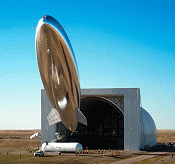 Japan's SoftBank is developing
airship-based
4G and 5G cell masts. "With more than 8,000 Starlink satellites in the sky today,
low Earth orbit may seem like the place to be to connect the next generation of
Internet and cellphone customers. However, some players are placing their bets slightly
closer to the ground. Starting next year, Tokyo's SoftBank Corp. will be beaming
a prototype 4G and 5G phone and broadband service from the stratosphere to Japanese
end users. Floating 20 kilometers above the Earth, the company's airship-based mast
will be using energy regeneration..." Japan's SoftBank is developing
airship-based
4G and 5G cell masts. "With more than 8,000 Starlink satellites in the sky today,
low Earth orbit may seem like the place to be to connect the next generation of
Internet and cellphone customers. However, some players are placing their bets slightly
closer to the ground. Starting next year, Tokyo's SoftBank Corp. will be beaming
a prototype 4G and 5G phone and broadband service from the stratosphere to Japanese
end users. Floating 20 kilometers above the Earth, the company's airship-based mast
will be using energy regeneration..."
|
The Airplanes and Rockets Homepage Archive
is a comprehensive collection of every item appearing daily on this website since
2017 - and many from earlier years.
|


